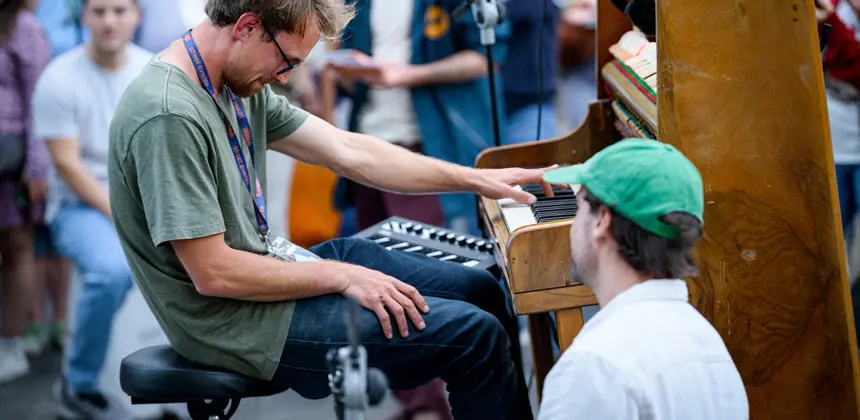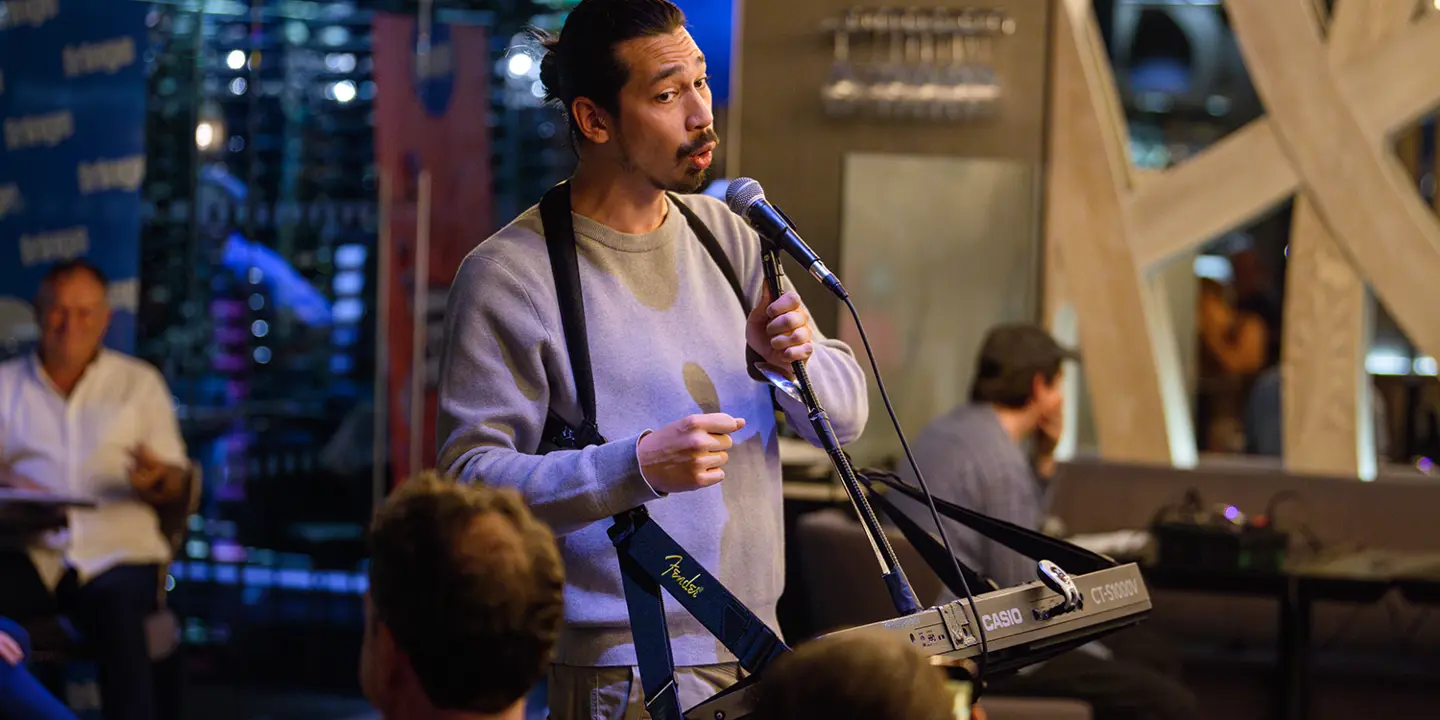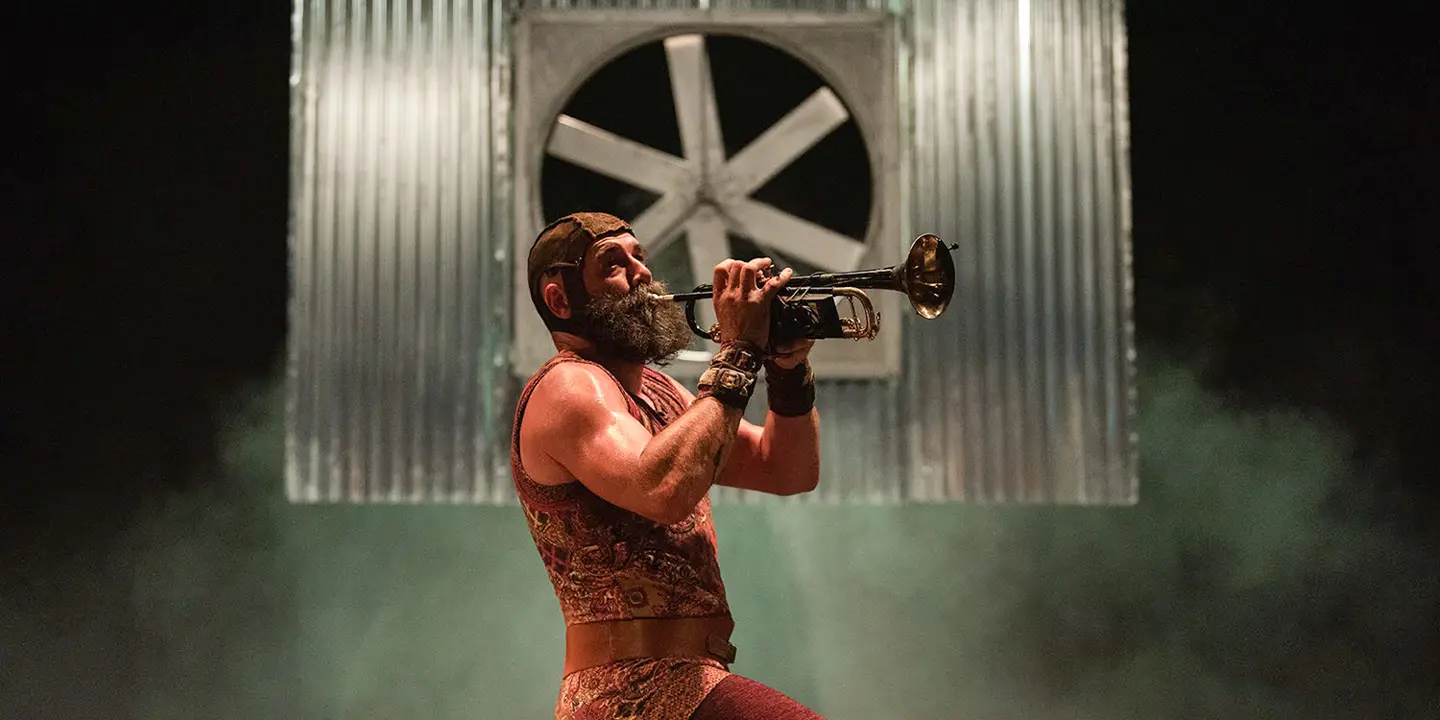Music licensing
Find out everything you need to know about arranging music licensing for a show for the Edinburgh Fringe.

Every registered Fringe show must fill in a PPL PRS declaration form, whether it uses music or not.
If you don’t submit the online form but have indicated in your show registration that you may need a music licence, we’ll automatically deduct 4% of your box office takings from your payout to account for any undeclared use of licensed music.
The 2025 PPL PRS declaration form is now closed. If you have any questions related to music licensing please email [email protected].
Please note: the PPL PRS form is for in-person shows only. If you are doing an online Fringe show which requires you to have a music licence, let us know by emailing [email protected].
Introduction
Many factors can influence a show or venue’s potential need for a music licence. The information on this page describes the various licensing elements Fringe companies should be aware of.
Please note: this information applies only to music licensing at the Edinburgh Festival Fringe. Many elements apply outside the Fringe, but the arrangement we have in place with PPL PRS Ltd is specific to the Fringe. You shouldn’t apply this guidance to any events that are not registered with the Fringe Society.
Music licensing at the Fringe
Each year we negotiate an arrangement with PPL PRS Ltd, the UK’s music licensing organisation. The deal ensures all Fringe companies and venues are appropriately licensed for the events they’re hosting.
It also simplifies the music licensing process for Fringe companies and sets out a tariff of music licence fees. This tariff is at a reduced rate compared to the tariff you’d pay for the same events outside of the Fringe.
The deal is also a blanket licensing arrangement; this means no direct permission is required from any rightsholder for the use of musical compositions or recordings within the repertoire of PRS, PPL or any of their affiliate licensing bodies around the world.
We collect music licensing information via the PPL PRS declaration form.
This information helps us calculate any licence fees you need to pay to cover your show’s music use; we then automatically deduct this from your Fringe Box Office payout.
If you are doing an online Fringe show which requires you to have a music licence, let us know by emailing [email protected].

The difference between PPL and PRS
In 2018 the Performing Rights Society for Music (PRS for Music, or PRS) and Phonographic Performance Limited (PPL) merged to form PPL PRS Ltd. Despite this merger, the two organisations still collect licence fees covering two different kinds of music rights. If you’re using music in your Fringe show, you may be required to pay a music licence fee to cover you for one, or both, of these licensing areas.
PRS fees relate to the use of musical compositions. These fees are distributed as royalties to composers who have registered their compositions with PRS or an affiliated performing rights organisation such as APRA in Australia or ASCAP in the US.
PPL fees relate to the use of specific musical recordings. These fees are distributed as royalties to the rightsholders of that recording, such as record labels and the musicians who played on the recording in question. As with PRS, PPL can collect fees on behalf of affiliate organisations around the world.
So, if in your show you play a live cover of Yellow Submarine by the Beatles, only a PRS licence would be required. If in your show you dance to the recording of Yellow Submarine that features on the Beatles’ album Revolver, both a PRS and a PPL licence would be required.
Paying a PRS fee will not affect whether you need to pay a PPL fee. Likewise, paying a PPL fee does not affect your potential need to pay a PRS fee. You may need to pay one, both or neither of these fees; regardless, you’ll still need to complete a PPL PRS declaration form.
Example licensing scenarios
We’ve put together some examples that demonstrate where PRS and PPL fees apply and where they do not.
- PRS ✓ – The vast majority of chart releases are compositions that are in copyright and will have been registered with PRS or an affiliated music licensing body. Unless you know that is not the case for the pieces of music being used, which would be unusual, PRS would apply here.
- PPL ✓ – PPL will apply to this music use. In the vast majority of cases, chart music recordings will have been registered with PPL or an affiliate.
- PRS ✓ – As the compositions are in copyright and will have been registered with a PRS-affiliated rights body, PRS fees will apply.
- PPL X – As no recorded music is used, there’s no need to pay a PPL fee.
- PRS X – As Beethoven’s compositions are no longer in copyright, PRS fees do not apply.
- PPL ✓ – Though the compositions themselves are out of copyright, the recording has been recently released and was not created specifically for the show, so PPL fees are required.
- PRS ✓ – Though the recording has been made in-company, rights still apply to the original composition, so a PRS fee will be due.
- PPL X – As long as the company member’s recording has not been registered with PPL or an affiliate, a fee would not be required. There are still rights connected to the recording, however, so the company should have a defined arrangement around its use with the company member who made it.
- PRS X – As long as the compositions haven’t been registered with PRS or an affiliate, no fee is required.
- PPL X – As long as the recordings haven’t been registered with PPL or an affiliate, no fee is required.
When is a music licence not required?
In the following situations, a show would not need to pay a music licensing fee. However, even if your show’s music use falls under any of these categories, you’ll still need to fill in the declaration form.
- The music is featured in a free show.
- No music is used in the show.
- The only music used in the show is:
- background music – music played in the space or venue before or after the show.
- incidental music – music that is not danced to, referenced, performed in any way or ‘heard’ by a character on stage.
- curtain music – music as the curtain rises or falls during the show.
- scene-change music – music between scenes when no performance is taking place.
This kind of music use is covered by a venue-level Background Music Licence. Venues can purchase temporary background music licences from the Fringe Society if the premises aren’t covered by an annual licence.
- Walk-on / walk-off music does not require a PRS fee or a PPL fee.
- When the music is out of copyright.
- PRS – musical compositions go out of copyright 70 years after the calendar year of the composer’s death.
- PPL – a recording of a piece of music goes out of copyright 70 years after its release.
- The copyright status of a composition is unaffected by the copyright status of the recording it’s featured on, and vice versa.
- When the music has not been registered with PRS, PPL or an affiliated licensing body.
- You’ll generally know this is the case because you’ll personally know the composer / rightsholder, or you’ll have purchased or acquired the music from a source that explicitly states no royalties are required for its use.
- If you don’t know whether a musical composition or recording has been registered with PRS or PPL, you should assume that it has.
- Copyright still applies to music that has not been registered with PRS or PPL; you’ll need to come to an arrangement with the rightsholder directly if this hasn’t already been stated.
- When your music use falls under Grand Rights. This is when you’re performing an existing dramatic or musical work that includes in-copyright music, but your licence to use that music is contained within the larger licence to perform the show itself. For example, if you have the rights to perform the musical Singin’ in the Rain, you’ll automatically have the right to perform the song Singin’ in the Rain in the context of that show.

Paying your PPL and PRS fees
When a show is required to pay a PRS and / or PPL fee, we calculate it using the information on the declaration form. We automatically deduct these fees from a show’s Fringe Box Office payout.
We calculate the PRS fee as a percentage of total ticket sales. This means that, if you’ve been selling tickets directly or through your venue, we’ll be in touch with you or your venue to confirm details of all sales made outside the Fringe Box Office, so we can ensure the fee is accurate. If you don’t submit a PRS declaration form but have indicated during registration that you may require a PRS licence, you’ll be charged a default fee at the highest rate (see tariff, below). If you or your venue don’t supply sales information, we’ll calculate fees on the assumption that all tickets not available through the Fringe Box Office have been sold.
Please note: the information below pertains to Fringe 2025 – we'll update it with the details for Fringe 2026 once these are confirmed, which is typically around March / April before the Fringe.
| Type of show | Charge |
|---|---|
| Free shows (no charge for admission) | No PPL charge |
| Ticketed shows (charge for admission) | < 2mins* – no charge 2-15mins* – 0.5% fee 15-30mins* – 0.75% fee 30-45mins* – 1% fee 45-90mins* – 1.5% fee 90+ mins* – 1.75% fee *duration of music contained in show that is eligible for a PPL fee |
If your show has a capacity of over 1,000:
Your show must be licensed directly by PPL PRS. Please call them directly on 0800 0720 808.
Please note that any shows that indicate that they use recorded music, but don’t provide details using our music licensing declaration form, will be charged a default PPL fee of the 1.5% of their total box office payout.
| Type of show | Music use | Charge |
| Free shows (no charge for admission) | Any |
PRS for Music will make no charge for music played at these events, in exchange for advertising of PRS for Music’s support. This advertising will be the responsibility of the Fringe Society and Fringe venues. Shows are still required to submit a PRS for Music declaration through the Fringe Society form. |
| Ticketed shows (charge for admission) in the Music genre category | Any |
4% fee Please submit a PRS for Music declaration through the Fringe Society form. |
| Ticketed shows in any other category | Shows using only incidental, curtain music and music during scene changes | No PRS charge, assuming a background music licence is in place at the venue. Shows are still required to submit a PRS for Music declaration through the Fringe Society form. |
| Shows using 2 mins or less of music eligible for a PRS fee | PRS for Music will make no charge for music played at these events, in exchange for advertising of PRS for Music’s support. This advertising will be the responsibility of the Fringe Society and Fringe venues. Shows are still required to submit a PRS for Music declaration through the Fringe Society form. |
|
| Shows using more than 2 mins of music eligible for a PRS fee | 2-15 mins* – 0.5% fee 15-30 mins* – 1.5% fee 30+ mins* – 4% fee *duration of music contained in show that is eligible for a PRS fee Please submit a PRS for Music declaration through the Fringe Society form. |
If your show has a capacity of over 1,000:
Your show must be licensed directly by PRS for Music. Please call PRS directly on 0800 068 4828 to arrange a licence.
FAQs
Yes. We ask all shows to fill in the PPL PRS declaration form. If you don’t fill in the form, we may charge you a default fee to account for any undeclared music use.
Yes. One of the conditions of having your music registered with PRS or an affiliate is that you have to declare its use when performing live. Any fee you pay is then redistributed back to you as royalties. This is a general condition of PRS membership; it’s not an aspect of music licensing we can change for the purposes of the Fringe.
If you are parodying the style of an artist, without using any of their lyrics or music, then you don’t need to pay a fee for this. If you adapt an existing piece of music, by changing the lyrics for example, then the original composition is still being used and so a music licence is still required.
If you are using in-copyright music that has not been registered with PPL / PRS / their affiliates, you will need to contact the rightsholder directly to request permission to use the music and negotiate the terms of that use and any fee to be paid.
Yes. Both PRS and PPL are affiliated with equivalent rights bodies around the world and license the music from those organisation’s repertoires. Find out more:
If you are using music that forms part of an existing dramatic / musical work and you have an existing licence to perform the show as a whole including the music, this falls under Grand Rights and can be indicated in the form – you won’t need to pay a fee. If this isn’t the case and you separately have an existing licence for the use of a PRS / PPL-controlled piece of music, please email [email protected] confirming the details of this licence.
Many venues have a music licence in place which covers the premises for background music use. This covers some of a show’s potential music use (see our background music definitions, above) but doesn’t cover an event that has featured music – ie music that is performed, danced to or referenced on stage.
If the music hasn’t been registered with PPL PRS, the arrangement is between you and the composer / rightsholder – so long as you make us aware of that, we won’t deduct a PPL PRS fee. If the music has been registered with PPL PRS then you’ll need a music licence; this is something that the composer should know if they’re a member of PRS or PPL.
You should submit a declaration form in either case. Email [email protected] if you have any questions.
If you want to adapt or change existing music then you still need to make contributions for the use of the original music through PRS and PPL as appropriate. You should also get permission directly from the copyright holders for the changes you wish to make. The copyright holders’ details will be included on the published copy of the music or recording.
Yes, providing the music use falls within the categories of music use that require a licence (see our list of music licence exemptions, above). It’s a common misconception, but there is no regulation stating that the use of an excerpt below a certain length is exempt from charges.
Printed Music and Copyright
Sheet music and lyrics are protected by copyright – groups must seek permission from each publisher whose music they are using-usually for a fee-or hold a proper licence.
The Printed Music Licensing Limited (PMLL) Amateur Group Singing Licence (AGSL) covers choirs and theatre groups for photocopying sheet music and lyrics, including minor arrangements like key changes.
Explore the Amateur Group Singing Licence or Amateur Choir Licence.
